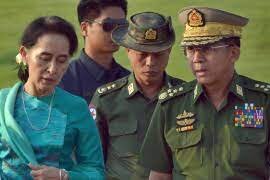According to the confused conspiracy fantasies known as QAnon, the American military would arrest President Joe Biden and hundreds of other elected government officials, declare martial law, overturn the November election and return the country to the nationalist rule of former president Donald Trump. In QAnon parlance this was “the Storm.”
Although unconnected with QAnon, there has been a Storm in Myanmar that is no foolish fantasy, but a grim, brutal and continuing reality.
Similarities
NLD leader Aung San Suu Kyi and Gen. Min Aung Hlaing before the coup
Like President Trump, the Myanmar military, known as the Tatmadaw, didn’t like the results of their November elections. Those elections gave the civilian National League for Democracy 82 per cent of the vote and strengthened party leader Aung San Suu Kyi in her efforts to reduce the Tatmadaw’s long domination of the country. The political party supported by the military and commander-in-chief Gen. Min Aung Hlaing fared even more poorly than expected.
Like President Trump, the military claimed electoral fraud, but the national electoral commission, like electoral authorities in the United States, rejected those claims. Like the January 6 assault on the US Congress, the Tatmadaw moved to prevent the seating of the newly-elected leadership. Unlike in the United States, however, the Storm in Myanmar was all-too effective.
A Real Storm
Troops arrested Aung San Suu Kyi, President U Win Myint, cabinet ministers, the chief ministers of several regions, NLD politicians, writers and activists. The Tatmadaw suspended telephone and internet access in major cities and shut down the stock market and commercial banks. It began secret trials for those arrested, with a military spokesman alleging bizarre offenses against Aung San Suu Kyi.
The people of Myanmar saw the progress towards democracy and civilian rule over the past five years snatched away from them and they protested. Thousands of people across the country banged on pans, put up signs and marched in the streets calling for a return to the government they elected. The military and the police responded with violent measures to stop them.
Thousands of Myanmar citizens marched in the streets calling for an end to the military takeover
Repression in Myanmar
The UN special rapporteur for Myanmar reported that security authorities killed at least 70 people since the protests erupted. They have arrested more than 2,000 people, with evidence that many of those arrested suffered beatings, torture and execution.
Police fire on people protesting the coup
Videos taken during the protests show police and soldiers beating protesters, destroying property, looting businesses and firing into people’s homes. Amnesty International reported that the Tatmadaw had carried out “systematic and premeditated killings.”
“These are not the actions of overwhelmed, individual officers making poor decisions. These are unrepentant commanders already implicated in crimes against humanity, deploying their troops and murderous methods in the open,” Amnesty said.
Like the call to overturn the elections in the United States, the Myanmar coup appears at least partly motivated to maintain the political power and business interests of one man.
Without the coup,Gen. Min Aung Hlaing was due to retire in July, putting at risk not only his control of the military and the cabinet and parliamentary seats allotted to it, but also his influence over a patronage network that includes two lucrative family business conglomerates. With the coup he has become a virtual dictator.
Bizarre Beliefs
Myanmar’s military believes it has the right to rule
The QAnon “Storm” was based on a bizarre complex of conspiracy theories and political dissatisfaction. The Myanmar “Storm” is based on the bizarre conviction of the Tatmadaw that it is the sole savior of the Myanmar nation and deserves its dominance over a people too stupid for self-rule.
The mob assault on the US Congress led to five deaths. The Tatmadaw’s assault on democracy has already led to far more.
International Impact
The question for democratic countries around the world is what are they willing to do to support the protesters facing the bullets and beatings of the Tatmadaw and seeking a return to democracy.
The UN Security Council expressed for the democratic transition in Myanmar, and call on the Tatmadaw to “refrain from violence, fully respect human rights and fundamental freedoms and uphold the rule of law.”
Several governments, including the Biden administration, have announced economic and diplomatic sanctions against the Tatmadaw. Sanctions appear to have played a role in the reforms leading to the 2015 elections. The increased dependence of military businesses on international trade and financial linkages may make sanctions even more effective now – but they must be rigorously enforced. China and the Association of Southeast Asian Nations, as Myanmar’s closest neighbors have a particular responsibility despite their own anti-democratic inclinations.
The international stakes in Myanmar have risen from the time when the country was a sleepy tropical backwater of little importance to the rest of the world.
With the Myanmar people’s apparent determination to oppose the military takeover, there is a danger that violence will increase. General strikes are already making an impact. Neighboring countries, Bangladesh, China and Thailand could face an influx of refugees fleeing violence and economic collapse. A successful Myanmar military coup would encourage militarist/nationalist opposition to democracy in other countries and discourage pro-democracy movements in places such as Thailand, Hong Kong, Egypt and Belarus.
The QAnon Storm’s threat to American democracy quickly collapsed before strong American institutions and the US military’s long-standing support for civilian rule. The Storm in Myanmar poses a far more difficult challenge to democracy everywhere.




